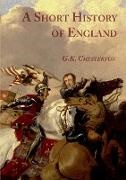Read more
"It will be very reasonably asked why I should consent, though upon a sort of challenge, to write even a popular essay in English history, who make no pretence to particular scholarship and am merely a member of the public. The answer is that I know just enough to know one thing: that a history from the standpoint of a member of the public has not been written. What we call the popular histories should rather be called the anti-popular histories. They are all, nearly without exception, written against the people; and in them the populace is either ignored or elaborately proved to have been wrong."
About the author
Gilbert Keith Chesterton KC*SG was an English author, philosopher, Christian defender, and literary and art reviewer who was born on May 29, 1874, and died on June 14, 1936. Chesterton wrote about theology and made up the character Father Brown, a priest-detective. Some people who don't agree with him have seen how popular books like Orthodoxy and The Everlasting Man are. Chesterton often called himself a "orthodox Christian," and this view became more and more similar to Catholicism until he finally left high church Anglicanism. Authors from the Victorian era like Matthew Arnold, Thomas Carlyle, John Henry Newman, and John Ruskin saw him as an heir. The "prince of paradox" has been used to describe him. A review in Time said this about Chesterton's writing style: "Whenever possible, Chesterton made his points with popular sayings, proverbs, and allegories-first carefully turning them inside out." His writings had an impact on Jorge Luis Borges, who said that his writings were like Edgar Allan Poe's. Chesterton was born in Campden Hill, Kensington, London. His father, Edward Chesterton (1841-1922), was an estate agent, and his mother, Marie Louise Grosjean, was from Switzerland and France. Chesterton was baptized into the Church of England when he was one month old, even though his family was a Unitarian and only sometimes followed their beliefs.

